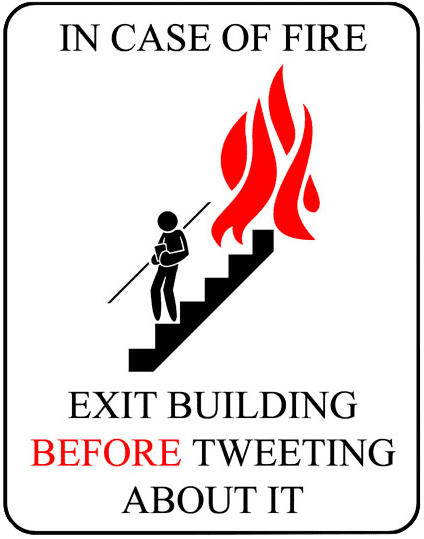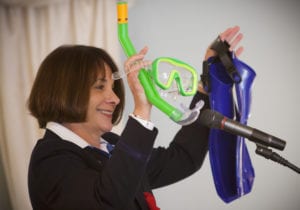 Is there a role for humor while training first responders on critical, life-saving, skills?[tweet this]
Is there a role for humor while training first responders on critical, life-saving, skills?[tweet this]
The flight attendant begins dolling out the obligatory, in fact, federally mandated, pre-flight safety instructions. If you’re a frequent flyer, your situational awareness is probably pretty low. You know the routine and it’s boring. If you’re an infrequent flyer, the monotone, or should I say mono-drone, voice of the lead flight attendant is enough to make you bury your eyes deep into the sky magazine. But, on this flight, something’s different.
The flight attendant begins by saying:
“Our airline employs some of the safest pilots in the industry. Unfortunately, our flight today doesn’t have any of them so you’d better fasten your seat belt and pay close attention to what I’m about to lay down. There may be fifty ways to leave your lover but there are only six ways to leave this airplane.“
All eyes and ears were immediately fixated on the lead flight attendant. Trust me, I was on the flight and witnessed it first-hand. This was one of the best stand-up comedic routines I’ve seen in a long time. I enjoyed it. Wait…did I just say I enjoyed a pre-flight briefing?

What made a speech I’ve heard over 500 times so damn interesting? There are two explanations, both rooted deep in cognitive neuroscience. First, the speech was unexpected. We listen with bated anticipation to hear things that surprise us. That’s why talk show hosts and newscasters bait listeners with phrases like: “When we come back we’re going to show you an amazing video you’re not going to want to miss” and we wait to see it.
Second, it was emotional. Emotional messages (and it doesn’t matter what emotion the messages invoke) not only capture and keep our attention, but they help in the uptake and storage of those messages into long-term memory. That’s right, you tend to remember and recall emotional messages and events with much more accuracy than boring messages and boring events. How well does it work? That flight attendant greeting I shared with you was from a flight I took in 2005. I remember it like it was yesterday.
Ok…for you instructors out there who are sharing important, life-saving messages – remember: make portions of your message unexpected and use emotions. [tweet this] Both will not only keep attention, but they will also help in learning and recall. Anyone who has attended one of my programs knows I use a healthy dose of both. The results are truly win-win. The attendees are satisfied with their day of learning on how lessons from cognitive neuroscience can improve responder safety, and I have the satisfaction of knowing those lessons are going to stick with the attendees for a long time.
_____________________________________________________________
The mission of Situational Awareness Matters is simple: Help first responders see the bad things coming… in time to change the outcome.
Safety begins with SA!
_____________________________________________________________
Share your comments on this article in the “Leave a Reply” box below. If you want to send me incident pictures, videos or have an idea you’d like me to research and write about, contact me. I really enjoy getting feedback and supportive messages from fellow first responders. It gives me the energy to work harder for you.
Thanks,

Email: Support@RichGasaway.com
Phone: 612-548-4424
Facebook Fan Page: www.facebook.com/SAMatters
Twitter: @SAMatters
LinkedIn: Rich Gasaway
YouTube: SAMattersTV
iTunes: SAMatters Radio


Pingback: The Facilitated Debrief: A Lesson From Aviation | Situational Awareness (SA) Matters!
Rich you nailed it!
That flight attendant was so effective that she went viral within the airline.
She became, for a while at least, the safety briefing message for all aircraft equipped with video equipment.
Effective? Yes!
Memorable? You bet, and as instructors isn’t that what we want?
What you are doing for the fire industry is the same that the airlines in the United States have been doing for safety for nearly two decades.
Keep it going!
Pete,
Thank you for the kind comments. You know that much of my inspiration comes from you and the experiences you have shared with me for your police, fire, EMS and airline experience. I sometimes feel like I’m pushing a heavy rock up a steep hill. I’m encouraged to know there are friends, like yourself, helping me out and supporting me. It means A LOT! ~ Rich
Rich, Way to nail it. Too many times we hear bla bla bla when listening to EMS speaches. Life & Safety but it is done with out passion or a way to delivery a messgae. One of the best classes I took was Fire Prevention dealing with the code…My instructor Hans was amazing. Funny, and was able to entertain the class on very dry stuff…but he was effective while engaging the class at all times…it made a huge difference. Great article! keep them coming. Got this link through Linkedin.
Jason,
Thanks for the feedback. It doesn’t surprise me that you’d say the instructor you described taught one of the best classes you’ve taken. Laughter releases some powerful memory enhancing hormones.
Rich
I’m planning to share this with other 55+ Driving Improvement instructors. I myself try to incorporate this concept when I teach an otherwise dry, power-pointed class. I get my Senior participants to visualize situations & share real-life scenarios. If I can interject humor @ certain points, I’ve noticed how the whole class pricks up their ears. This is an excellent explanation of why that is. Thanks!